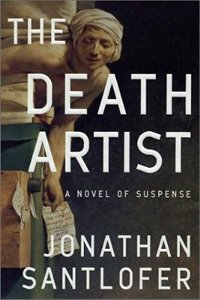
 Classics in September — Today we’re honoured to present a guest column by one of the most respected names in crime fiction – Jonathan Santlofer. The author of numerous bestsellers in the genre, including The Death Artist, Color Blind, The Killing Art, Anatomy of Fear and The Murder Notebook, last year he helped found the Crime Fiction Academy in New York. His classic crime cred is impressive as well, with his short stories appearing in the Ellery Queen Magazine, Akashic’s New Jersey Noir, and LA Noire, a compilation which tied in with a PlayStation/Xbox game of the same name. He edited the book, which also included stories by Megan Abbott, Lawrence Block, Joe R Lansdale, Joyce Carol Oates, Francine Prose, Duane Swierczynski and Andrew Vachss.
Classics in September — Today we’re honoured to present a guest column by one of the most respected names in crime fiction – Jonathan Santlofer. The author of numerous bestsellers in the genre, including The Death Artist, Color Blind, The Killing Art, Anatomy of Fear and The Murder Notebook, last year he helped found the Crime Fiction Academy in New York. His classic crime cred is impressive as well, with his short stories appearing in the Ellery Queen Magazine, Akashic’s New Jersey Noir, and LA Noire, a compilation which tied in with a PlayStation/Xbox game of the same name. He edited the book, which also included stories by Megan Abbott, Lawrence Block, Joe R Lansdale, Joyce Carol Oates, Francine Prose, Duane Swierczynski and Andrew Vachss.
We thought it would be a great idea to invite Jonathan to write a guest column about whether or not anybody can become a crime writer. And now, it’s over to him…
Can anyone be a crime writer? Maybe. Like anyone can be a painter. Though maybe not a dancer. Or a singer. Though you can try.
So what am I saying?
I’m saying you can learn to write crime fiction. Maybe not as well as John Le Carre or Elmore Leonard or Ruth Rendall, but you can learn to write a competent crime story. And if you have some talent, a good one.
I was recently on National Public Radio, on the Leonard Lopate Show, and he asked me, and my co-guest, the crime writer Lawrence Block, if it was possible to ‘teach’ writing. Block said no, and yet he’s written a book on just that: How to write. I believe I hesitated – I have yet to listen to the tape because I dread the sound of my own voice – but I certainly believe you can be taught to write. How else to explain the proliferation of MFA writing programs all across the country? Surely those students and teachers must believe writing can be taught, otherwise they are wasting a lot of time, energy and money.
Once, I was on a panel of crime writers and a similar question was posed: Can you learn to write? I said yes. The crime writer SJ Rozan said yes. All but one writer said yes, and the one who said no – a well-known writer who will go unnamed – said, “If you don’t have talent you can’t learn, and whatever talent you have, that’s it!” I was horrified. If I thought I was never going to get better, never going to learn more about writing, I’d stop now. Really, why would I bother? I write as much for myself as for others and if I’m not learning, not improving, I’m simply not interested.
I’ve had an odd, bifurcated life, half in art and half in writing and I have been taught both crafts. When I started art school I had some raw talent but no idea what to do with it until some very smart artist/instructors taught me about composition and design and colour and, more importantly, how to be self-critical and how to put it all together in paintings that might matter.
 And the same is true of writing. There is surely a composition to one’s words, sentences, paragraphs and pages – the single sentence relates to the entire story or novel in the same way that each stroke contributes to a complete painting, and if you cannot edit your writing in the same way that one must be self-critical about a painting, you are doomed. And these things can be taught.
And the same is true of writing. There is surely a composition to one’s words, sentences, paragraphs and pages – the single sentence relates to the entire story or novel in the same way that each stroke contributes to a complete painting, and if you cannot edit your writing in the same way that one must be self-critical about a painting, you are doomed. And these things can be taught.
When I first starting writing I forced myself to read critically, to dissect stories and novels, to really see what a writer was doing, how he or she structured a novel or story, how they used language and doled out information. I took classes and workshops though perhaps the best teacher I had was my friend the poet Jan Heller Levi who sat with me and line edited my first novel, The Death Artist, pointing out various dos and don’ts until I saw how it was done. I still hear her voice when I’m writing.
I teach crime writing in the Creative Writing program at Pratt Institute, where I take my students through a series of writing exercises and by the end of the semester everyone can write a nifty little crime story. Okay, so you’re thinking, “Well sure, they’re writing students,” and that’s true. But at Crime Fiction Academy, part of Manhattan’s illustrious Center For Fiction, I have seen astonishing progress and results from students with little to no formal writing background. After 12 weeks of being taught how to zone in on their voice, how to plot, to strengthen character, to trim away anything unnecessary, how to hold the reader’s interest and make them turn the pages every one of them can write a terrific crime story.
Noreen Tomassi, the director of the Center For Fiction, and I would not have created Crime Fiction Academy if we did not believe one could teach writing. In fact, it’s a passion of mine: to find writers with potential and to help them write the best books they can possibly write and get them published – and we see that reality happen every day.






